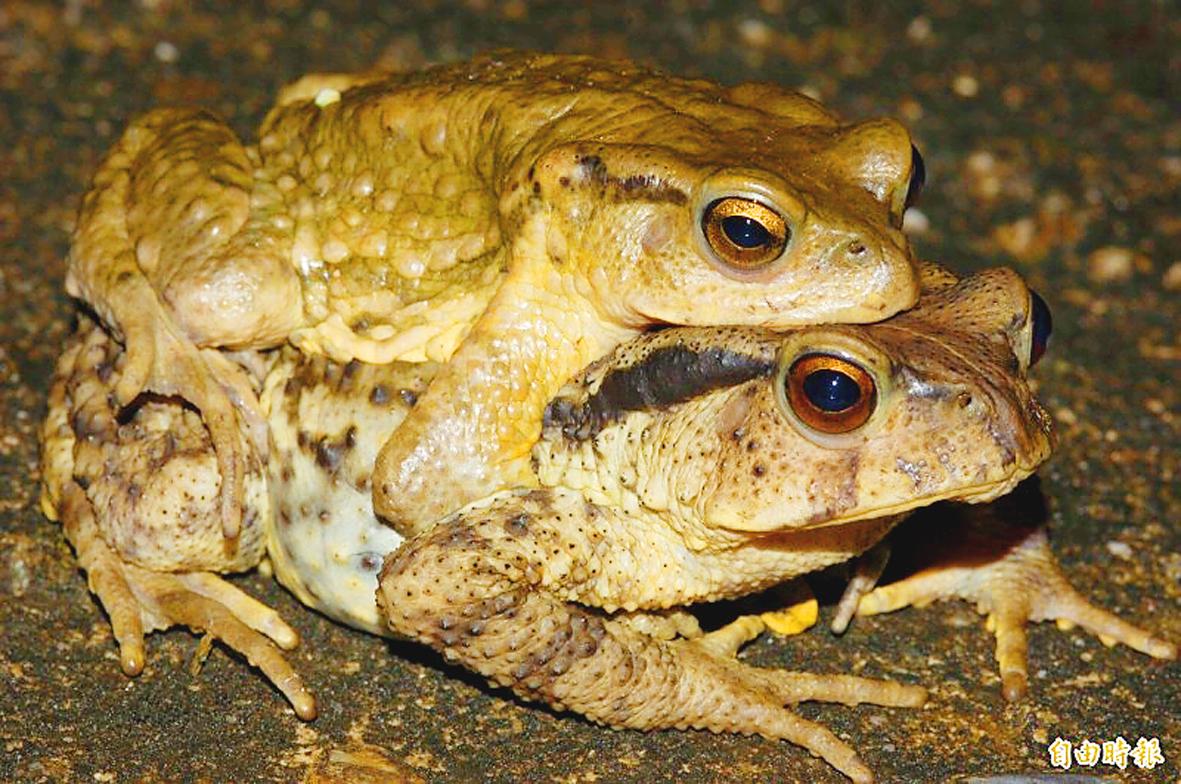The Food and Drug Administration (FDA) yesterday urged the public not to eat wildlife or unidentified wild plants, as they could be fatal, with nearly 7,000 people affected by food poisoning last year, including two deaths due to wildlife consumption.
The number of food poisoning incidents increased by nearly 50 percent last year, from 398 cases involving 4,616 people in the previous year to 503 cases involving 6,944 people, FDA data showed.
That figure was the second-highest in history, the FDA said, adding that the highest number was recorded in 1997, with 7,235 people.

Photo: Hua Meng-ching, Taipei Times
Among the 503 cases, 87 were food poisoning clusters affecting 4,019 teachers and students, due to contaminated food provided by caterers, the agency said.
The major causes of food poisoning last year included toxins produced by two kinds of bacteria — Bacillus cereus and Staphylococcus aureus — both of which grow in food that has been improperly stored, the FDA said, citing as an example a person who fell ill after eating a souffle, as the dessert had spawned S aureus after having been left at room temperature for a prolonged period.
“Danger zone” is a medical term defined as the temperature range in which food-borne pathogens can grow, with the range falling between 7°C and 60°C, said Yen Tzung-hai (顏宗海), director of Linkou Chang Gung Memorial Hospital’s Department of Clinical Toxicology.
In summer, high temperatures can easily cause bacteria to grow in food and infect people with acute gastroenteritis, which is characterized by symptoms such as nausea, vomiting, diarrhea and fever, Yen said.
Norovirus was another major cause of food poisoning last year, the FDA said.
Taiwan had no cases of death due to food poisoning for six consecutive years until last year, when two people died after eating wildlife, FDA official Chou Pei-ju (周珮如) said.
One died after drinking soup made with a “frog” that he caught, which was later identified as a poisonous Central Formosa toad, or Bufo bankorensis.
The other person died after eating self-picked wild mushrooms, which included false parasol, a poisonous fungus, Chou said.
Past analyses showed that some people accidentally ate poisonous toads thinking they were edible frogs, said Yang Chen-chang (楊振昌), a toxicologist at Taipei Veterans General Hospital.
The mortality rate in patients who consumed toxins produced by animals is higher than those produced by plants, Yang added.
Another popular misconception is that only animals and plants that are bright and vivid in color are poisonous, Yang said, urging people to exercise more caution, stop eating wildlife and safeguard their health.

CHIP WAR: The new restrictions are expected to cut off China’s access to Taiwan’s technologies, materials and equipment essential to building AI semiconductors Taiwan has blacklisted Huawei Technologies Co (華為) and Semiconductor Manufacturing International Corp (SMIC, 中芯), dealing another major blow to the two companies spearheading China’s efforts to develop cutting-edge artificial intelligence (AI) chip technologies. The Ministry of Economic Affairs’ International Trade Administration has included Huawei, SMIC and several of their subsidiaries in an update of its so-called strategic high-tech commodities entity list, the latest version on its Web site showed on Saturday. It did not publicly announce the change. Other entities on the list include organizations such as the Taliban and al-Qaeda, as well as companies in China, Iran and elsewhere. Local companies need

CRITICISM: It is generally accepted that the Straits Forum is a CCP ‘united front’ platform, and anyone attending should maintain Taiwan’s dignity, the council said The Mainland Affairs Council (MAC) yesterday said it deeply regrets that former president Ma Ying-jeou (馬英九) echoed the Chinese Communist Party’s (CCP) “one China” principle and “united front” tactics by telling the Straits Forum that Taiwanese yearn for both sides of the Taiwan Strait to move toward “peace” and “integration.” The 17th annual Straits Forum yesterday opened in Xiamen, China, and while the Chinese Nationalist Party’s (KMT) local government heads were absent for the first time in 17 years, Ma attended the forum as “former KMT chairperson” and met with Chinese People’s Political Consultative Conference Chairman Wang Huning (王滬寧). Wang

CROSS-STRAIT: The MAC said it barred the Chinese officials from attending an event, because they failed to provide guarantees that Taiwan would be treated with respect The Mainland Affairs Council (MAC) on Friday night defended its decision to bar Chinese officials and tourism representatives from attending a tourism event in Taipei next month, citing the unsafe conditions for Taiwanese in China. The Taipei International Summer Travel Expo, organized by the Taiwan Tourism Exchange Association, is to run from July 18 to 21. China’s Taiwan Affairs Office spokeswoman Zhu Fenglian (朱鳳蓮) on Friday said that representatives from China’s travel industry were excluded from the expo. The Democratic Progressive Party government is obstructing cross-strait tourism exchange in a vain attempt to ignore the mainstream support for peaceful development

DEFENSE: The US would assist Taiwan in developing a new command and control system, and it would be based on the US-made Link-22, a senior official said The Ministry of National Defense is to propose a special budget to replace the military’s currently fielded command and control system, bolster defensive resilience and acquire more attack drones, a senior defense official said yesterday. The budget would be presented to the legislature in August, the source said on condition of anonymity. Taiwan’s decade-old Syun An (迅安, “Swift Security”) command and control system is a derivative of Lockheed Martin’s Link-16 developed under Washington’s auspices, they said. The Syun An system is difficult to operate, increasingly obsolete and has unresolved problems related to integrating disparate tactical data across the three branches of the military,